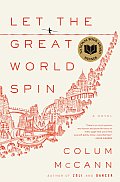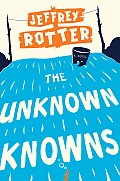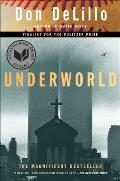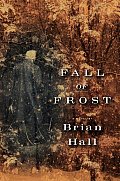Describe your latest project. Let the Great World Spin is a novel that takes place mostly on one day in New York in 1974, though its main motifs (art, religion, war, technology) are easily folded over onto today. We follow an artist, an Irish monk, a Park Avenue mother, and others as their lives slowly twine into and around one another. Part of the thread of the book is a tightrope walk across the World Trade Center towers based on the "art crime of the century" by Philippe Petit. But instead of focusing on Petit, the novel focuses on the people down below, the beauty and tenderness and violence that is found in the ordinary lives. At the centre of the book are two lives that come crashing down; my twin towers, I suppose. Much of the rest of the book is spent building them up. It's a social novel and a celebration of the city. It's also a book about redemption, or at least its possibility.
Let the Great World Spin is a novel that takes place mostly on one day in New York in 1974, though its main motifs (art, religion, war, technology) are easily folded over onto today. We follow an artist, an Irish monk, a Park Avenue mother, and others as their lives slowly twine into and around one another. Part of the thread of the book is a tightrope walk across the World Trade Center towers based on the "art crime of the century" by Philippe Petit. But instead of focusing on Petit, the novel focuses on the people down below, the beauty and tenderness and violence that is found in the ordinary lives. At the centre of the book are two lives that come crashing down; my twin towers, I suppose. Much of the rest of the book is spent building them up. It's a social novel and a celebration of the city. It's also a book about redemption, or at least its possibility.
What fictional character would you like to date, and why?
I'm not sure I'd like to date her, but for this new novel, a portion is narrated by a woman called Tillie, a 38-year-old hooker in the Bronx. I think she's the sassiest character I've ever come up with. She sort of intruded on me and made herself known, a real livewire. Her story is that she hangs out under the Major Deegan in the Bronx in the early '70s, remembering her old days "in the life." Her whole world is falling down around her, but she manages, for the most part, to hold on to her dignity. Her voice surprised me so much that I still think of her, dream of her, reinvent her. The chapter title is called "The House that Horse Built," with the horse obviously referring to heroin. The real privilege of fiction is that we get to step into another skin, another geography, another culture. I spent six months with her voice in my head. So I'd like to meet her again, in a real sense, to take her out. No dream date or anything. I'm not talking champagne and caviar. We'd probably share a stale supermarket cake and sit under the Deegan listening to the cars going past.
What's the strangest or most interesting job you've ever had?
Back in the mid-1980s, over the course of two years, I worked with a group of juvenile delinquents in Texas. Tough kids who'd been in and out of various prisons, institutions, and broken homes. I ran the wilderness camp where I looked after six boys for three months. It wasn't a boot camp, but it certainly wasn't Camp Paradise, either. We built our own treehouses, gravity-fed shoulders, outdoor latrines. We even cultivated a little plot of land. It was an extraordinary adventure, dealing with tough kids, some of whom had been in gangs, others who had committed serious crimes. I was with them morning, noon, and night. All sorts of extraordinary things happened. Sometimes at night — with coyotes in the fields nearby — I would read them to sleep. Honestly! They allowed me to read to them! There wasn't any TV, after all. One of their favourite books was The Catcher in the Rye. Another was a little fable called Fup by Jim Dodge. Fup was about a duck — there's an anagram there, of course. They were two fascinating years, working with various groups. I still get phone calls from these kids — most of whom got out okay, and some of whom really thrived. But every now and then the call or letter comes from a prison block.
Introduce one other author you think people should read, and suggest a good book with which to start.
 There are so, so many. I don't suppose he needs any introduction at all, but I adore John Berger. He's a hero of mine. So I would begin at his beginning, with the novel A Painter of Our Time. And then I would move on to To the Wedding. Then I would jump back to G. And then I would go to Ways of Seeing. And then I would hopscotch all over one of the most glorious minds of our time.
There are so, so many. I don't suppose he needs any introduction at all, but I adore John Berger. He's a hero of mine. So I would begin at his beginning, with the novel A Painter of Our Time. And then I would move on to To the Wedding. Then I would jump back to G. And then I would go to Ways of Seeing. And then I would hopscotch all over one of the most glorious minds of our time.
In terms of younger writers, I'm very fond of Marlon James, who just came out with The Book of Night Women, a glorious novel about a Jamaican slave revolt. Marlon's the real deal: the prose is intense and intricate and (though he hates the word) lyrical. Marlon also happens to be a good friend, but I see no harm in shouting out for him.
This spring, a former student of mine, Jeff Rotter, published his first novel, The Unknown Knowns. A hard time to bring out a novel, but he has suceeded wonderfully. Hallelujah. I look forward to his next.
Offer a favorite sentence or passage from another writer.
"No matter. Try again. Fail again. Fail better."
—Samuel Beckett
Have you ever made a literary pilgrimage?
I once walked across Ireland to meet an author who was very important to me: Des Hogan, a writer who, along with Neil Jordan and others, helped shape a lot of contemporary Irish fiction in the '70s and early '80s. It was a 10-day trip from Dublin to Galway. It was the middle of summer, so the weather was okay, and I slept out by rivers and in parks. A great trip. Walking is a cure for all sorts of things, but people thought I was mad. Somebody said to me one day: "You're three sandwiches short of a picnic." Perhaps I was, or am, but I loved the journey. I didn't even know if Des would be there. He was a real reclusive character and didn't have a phone or anything. So I got all the way to Clifden and found out where he was living. I walked up and said hello to him and shook his hand. He just grinned and looked out to sea. He pointed out at the waves and said, "They call those things white horses, y'know."
Why do you write?
Thomas Berger has the most beautiful answer to this question. "Why do writers write? Because it isn't there." Enough said. Or almost enough said. Vallejo said that mystery joins us together. And Joyce said that he wanted to create life out of life.
If you could have been someone else, who would that be and why?
 I teach at Hunter College in New York and recently had Don DeLillo come to class. It was an extraordinary day. He was incredibly profound and moving and gracious and just plain honest with the students. I was also stunned by his humility. At one stage he said to us, "I seem to be the beneficiary of an occasional revelation." This is the man who wrote Underworld, one of the best novels of the last 25 years. We went out afterwards with a couple of students and had dinner, and a few drinks, and I watched him climb into a cab, and I thought that I would like to be that mind, I would like to sit inside that mind, if even just for a while, traveling home to Bronxville on a March night in 2009. I would very much like that indeed, to be going in that direction.
I teach at Hunter College in New York and recently had Don DeLillo come to class. It was an extraordinary day. He was incredibly profound and moving and gracious and just plain honest with the students. I was also stunned by his humility. At one stage he said to us, "I seem to be the beneficiary of an occasional revelation." This is the man who wrote Underworld, one of the best novels of the last 25 years. We went out afterwards with a couple of students and had dinner, and a few drinks, and I watched him climb into a cab, and I thought that I would like to be that mind, I would like to sit inside that mind, if even just for a while, traveling home to Bronxville on a March night in 2009. I would very much like that indeed, to be going in that direction.
Recommend five or more books on a single subject of personal interest or expertise.
 Five Great Books about Literary Figures
Five Great Books about Literary Figures
Fall of Frost by Brian Hall
One of the most stunning books I read this year. He brings Robert Frost alive in the most stunning way. A tour de force. Hall is one of the quieter geniuses in American fiction. There's not all that much noise made about him, but I love his work and it will last.
Stoner by John Williams
A book, largely forgotten, that was published in the '70s, I believe. The opening page declares the main character John Stoner to be more or less a non-entity, his name becoming to older colleagues "a reminder of the end that awaits them all, and to the younger ones a sound which evokes no sense of the past." He ends up becoming a professor of the Classics in a Midwestern university. He fights no obvious wars, nor wins any grand intellectual battles, except that with poetry. The book is so beautifully paced and cadenced that it deserves the status of classic. It was also a favourite of the late John McGahern. So, McGahern to Williams. One profound craftsman to another.
Portrait of the Artist As a Young Man by James Joyce
A beautiful portrait of an evolving consciousness.
Fugitive Pieces by Anne Michaels
A book of memory to be remembered. Nobody writes like Anne Michaels. Such care is taken with each sentence, each sound, each bump of a letter against another letter. A poet lives at the book's very heart. Fugitive Pieces begins with a stunning image from the Holocaust and moves ever outwards.
The Winner of Sorrow by Brian Lynch
Lynch is an Irish poet/novelist recently published by Dalkey Archive. The book gets into the muck and the tar and the petalwork of the poet William Cowper. He is indeed the "monarch of all that I survey." It is a stylistic masterpiece and one of the best contemporary novels about a literary figure.